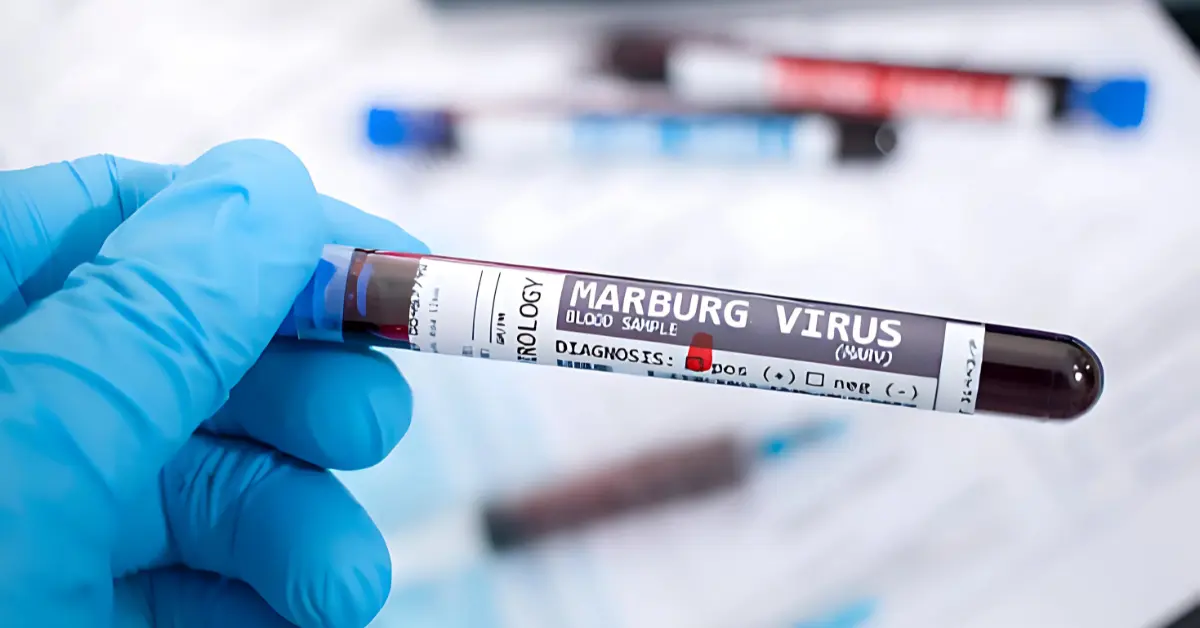The Marburg virus is a severe illness caused by a rare but deadly virus. Members of the same family as the Ebola virus, the disease is deadly in humans. The virus was first discovered in 1967, and has caused several outbreaks in various places around the world.
In this article, we will explore the nature of the Marburg virus, its symptoms, how it spreads, and the measures you can take to protect yourself and your loved ones.
What Is the Marburg Virus?
The Marburg virus is a type of filovirus that causes Marburg Virus Disease (MVD). It can cause organ failure and severe internal bleeding and even fever.
It was first spotted in an outbreak in Marburg and Frankfurt, Germany, on Belgrade in Serbia. The virus was traced to monkeys infected for research purposes that were imported to scientists.
The virus is now known to have originated in fruit bats that are their natural host; today. Humans can get the disease from animals and from one person to another through bodily fluid such as blood, saliva, and sweat.
This means outbreak can become rapidly if it is not contained. For instance, the Rwanda Marburg virus disease outbreak highlighted the need for better public health strategies to manage such emergencies.
How Does the Marburg Virus Spread?
The Marburg virus spreads through direct or indirect contact. Common ways the virus spreads include:
1. Infected Fluid Exposure to Athlete
The virus can be transmitted from bodily fluids of an infected person or animal: blood, saliva, etc.
2. Surfaces and Objects Contaminated.
The virus can be carried in items such as needles, clothing or bedding used by infected people.
3. Handling Infected Animals
Infection risks are increased by contact with bats or monkeys that carry the virus.
Particularly at risk are those people working in healthcare or caring for the infected. By using protective equipment and hygiene measures you can prevent the spread. Bleeding of the nose, gums or eyes Marburg virus spreads through direct or indirect contact. Common ways the virus spreads include:
Symptoms of Marburg Virus Disease
Symptoms of Marburg Virus Disease often appear suddenly. The first signs are:
- High fever
- Severe headache
- Muscle pain
- Nausea and vomiting
As the disease progresses, more severe symptoms develop, such as:
- Bleeding from the nose, gums, or eyes
- Rashes and bruising
- Organ failure
For example, the disease can be so severe within a week of the first symptoms that it causes shock and death. Depending on the outbreak and quality of medical care, the death rate is as high as 88%.
Prevention and Safety Measures.
Currently, there is no approved vaccine or antiviral treatment for the Marburg virus. And yet supportive care can improve survival. To stay safe, follow these preventive measures:
1. Practice Good Hygiene
It also comes down to regular hand washing with soap and water. When soap is unavailable use hand sanitizers.
2. Do not contact with Infected Persons
If someone is showing symptoms of Marburg Virus Disease, avoid physical contact and report it to health authorities immediately.
3. Limit Exposure to Wildlife
Don’t handle bats, monkeys or other animals that have been shown to carry the virus, especially in outbreak areas.
4. Use Protective Gear
When treating an infected patient, healthcare workers should be wearing gloves, masks and gowns. Medical waste disposal is necessary.
For more ways to maintain good health, check out Health Nutrition Tips, which provide insights into staying strong and healthy.
Recent Outbreaks of the Marburg Virus
The Marburg virus has caused multiple outbreaks in Africa and Europe. To produce these outbreaks, human exposure to bat colonies or infected animals are usually involved.
The Marburg virus outbreak in Rwanda drew global attention due to its rapid spread. The bug was contained by governments and international health organizations including the WHO.
Some discussions around health risks have included terms like Marlburg 5G, linking modern technology to diseases. But scientific research has failed to uncover any evidence which links 5G networks to the transmission of the viruses.

Strengthening Your immune system
A strong immune system can help your body fight infections, including severe diseases like the Marburg virus. Here are some tips to boost your immunity:
- Eat a Balanced Diet: Your meal should have fruits, vegetables, lean proteins and whole grain.
- Stay Active: Physical exercise improves your health and helps in boosting your immunological response.
- Get Enough Sleep: Your body is strong & healthy if you try to get 7-9 hours of sleep at night.
- Try Immunity Boosters: Natural remedies like Immunity Shots can give your body an extra boost.
We are fighting diseases more and more effectively due to medical advances. For instance, ongoing research into New Cancer Treatments is paving the way for better healthcare outcomes.
Why Awareness Is Key
Raising awareness about diseases like the Marburg virus is essential. Preparedness is supported by knowledge. Especially, it decreases stigma and fear around those that are affected.
Global efforts are also focused on other diseases, such as rising Norovirus cases, which highlight the importance of hygiene and public health measures.
So, they always suggest that stay informed through credible sources. For outbreaks, government, healthcare workers and the public are all key to cooperation.
Conclusion
The Marburg virus is a deadly disease that requires attention and action. This can help us understand how it spreads, recognise the symptoms and how we can take preventive measures to save lives.
Increasing your immunity and staying informed can protect you, and others around you. For more insights on staying healthy, explore Health Nutrition Tips or learn about advances in medicine through New Cancer Treatments.
We must do this together, to be healthy and safe. Be aware, protect yourself and act.



